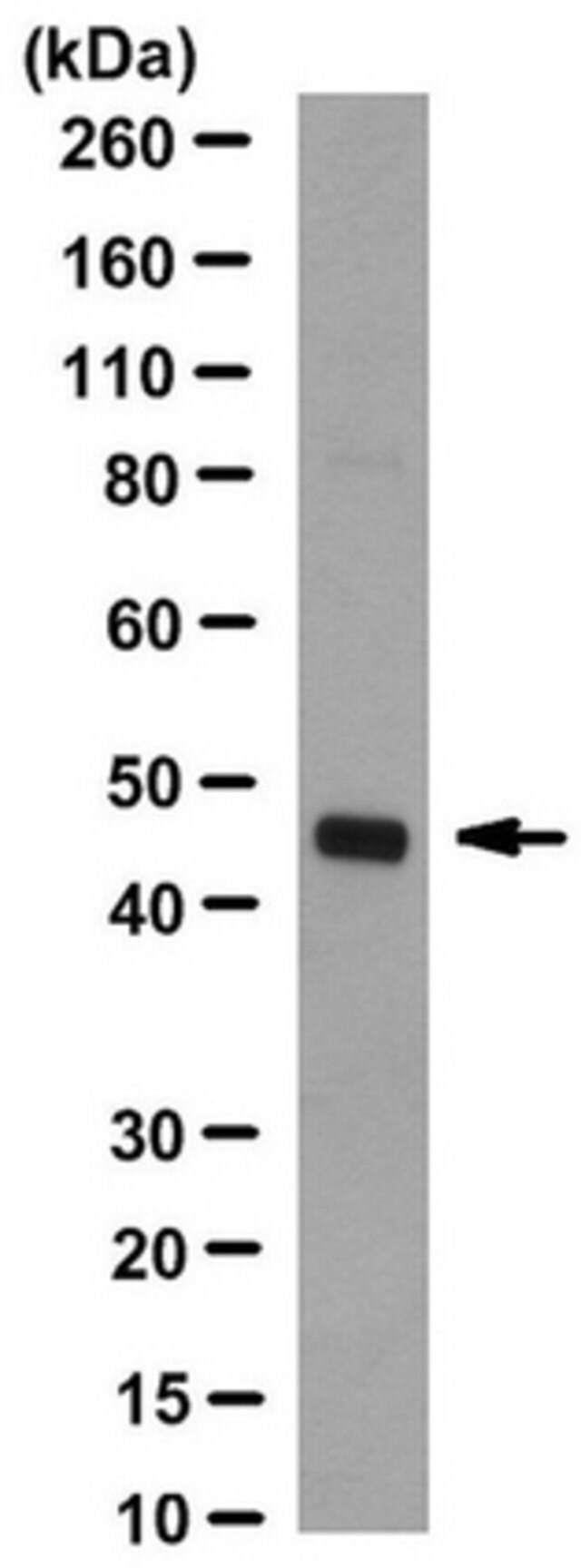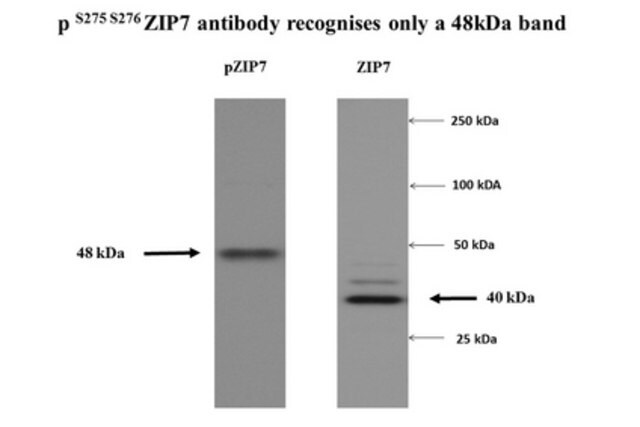您的位置:首页 > 产品中心 > Anti-phospho-ZIP7 (Ser275/276) Antibody, clone 3-3-3
Anti-phospho-ZIP7 (Ser275/276) Antibody, clone 3-3-3

产品别名
Anti-phospho-ZIP7 (Ser275/276) Antibody, clone 3-3-3
Zinc transporter SLC39A7, S256/S257-phosphorylated, Histidine-rich membrane protein Ke4, S256/S257-phosphorylated, Really interesting new gene 5 protein, S256/S257-phosphorylated, Solute carrier family 39 member 7, S256/S257-phosphorylated, ZIP7, S256/S2
基本信息
| eCl@ss | 32160702 |
| General description【一般描述】 | Zinc transporter SLC39A7 (UniProt Q92504; also known as Histidine-rich membrane protein Ke4, Really interesting new gene 5 protein, Solute carrier family 39 member 7, ZIP7, Zrt-, Irt-like protein 7) is encoded by the SLC39A7 (also known as HKE4, RING5) gene (Gene ID 7922) in human. Zinc transporters mediate the transport of zinc ions into intracellular compartments as well as the export of excess zinc out of cells. Disruption of zinc homeostasis is responsible for many chronic neurodegenerative diseases and acute neural injuries. Two classes of multi-pass transmembrane Zn transporters are known, including 10 ZnTs and 14 ZIPs, that exhibit opposing functions in mediating zinc homeostasis. ZIP7 serves as a gatekeeper of zinc release from intracellular stores that transports zinc from the endoplasmic reticulum/Golgi apparatus to the cytosol. This transport is stimulated by certain growth calcium, and exogenous zinc. ZIP7 is activated following its phosphorylation at Ser275 and Ser276 by casein kinase 2 (CK2). ZIP7-mediated zinc release from intracellular stores is shown to drive major pathways, such as MAPK, mTOR and PI3K-AKT that are involved in cell survival and proliferation and are activated in cancer cells. Elevated ZIP7 levels are reported in most metastatic melanoma cell lines and in some brain and colon cancer cell lines. Under hyperglycemic conditions, as in diabetes, alterations in ZIP7 phosphorylation have been reported along with opposing changes in the expression of ZIP7 and ZnT7, which induce marked redistribution of cellular free zinc with an increase in cytosolic free zinc and a reduction in sarco(endo)plasmic reticulum. These changes may contribute to cardiac dysfunction commonly observed in diabetes. (Ref.: Nimmanon, T., et al. (2017). Metallomics. 9(5):471-481; Tuncay, E., et al. (2017). Diabetes. 66(5):1346-1358). |
| Specificity【特异性】 | Clone 3-3-3 reconizes S256/S257 dual phosphorylated wild-type ZIP7, as well as S256D/S257D, but not S256A/S257A, ZIP7 mutant. |
| Immunogen【免疫原】 | KLH-conjugated phospho-peptide corresponding to the target region sequence with phosphorylated S256 and S257 residues. |
| Application【应用】 | Immunocytochemistry Analysis: Clone 3-3-3 hybridoma culture supernatant (1:100 dilution) immunostained 3.7% paraformaldehyde-fixed, 0.4% saponin-permeabilized MCF-7 cells transfected with wild-type and S256D/S257D, but not S256A/S257A, ZIP7 construct (Courtesy of Kathryn Taylor, Ph.D., Cardiff University, United Kingdom). Western Blotting Analysis: Clone 3-3-3 hybridoma culture supernatant (1:1,000 dilution) detected a ~48 kDa phosphorylated target band in lysate from wild-type ZIP7-transfected MCF-7 cells (Courtesy of Kathryn Taylor, Ph.D., Cardiff University, United Kingdom). Research Category Signaling Detect ZIP7 using this mouse monoclonal Anti-phospho-ZIP7 (Ser275/276) Antibody, clone 3-3-3, Cat. No. MABS1262, validated for use in Immunocytochemistry and Western Blotting. |
| Quality【质量】 | Evaluated by Western Blotting in MCF-7 cell lysate. Western Blotting Analysis: 0.5 µg/mL of this antibody detected ZIP7 S256/S257 phosphorylation in 20 µg of MCF-7 cell lysate. |
| Physical form【外形】 | Protein G purified. Purified mouse IgG1 in buffer containing 0.1 M Tris-Glycine (pH 7.4), 150 mM NaCl with 0.05% sodium azide. Format: Purified |
| Other Notes【其他说明】 | Concentration: Please refer to lot specific datasheet. |
产品性质
| Quality Level【质量水平】 | 100 |
| biological source【生物来源】 | mouse |
| antibody form【抗体形式】 | purified immunoglobulin |
| antibody product type | primary antibodies |
| clone【克隆】 | 3-3-3, monoclonal |
| species reactivity | human |
| species reactivity (predicted by homology) | porcine (based on 100% sequence homology), sheep (based on 100% sequence homology), bovine (based on 100% sequence homology), nonhuman primates (based on 100% sequence homology), canine (based on 100% sequence homology) |
| technique(s) | immunocytochemistry: suitable western blot: suitable |
| isotype【同位素/亚型】 | IgG1κ |
| NCBI accession no.【NCBI登记号】 | NP_001070984 |
| UniProt accession no.【UniProt登记号】 | Q92504 |
| shipped in【运输】 | ambient |
| Gene Information | human ... SLC39A7(7922) |
产品说明
| Target description【目标描述】 | ~48 kDa observed. 50.12 kDa (human ZIP7) calculated. Uncharacterized bands may be observed in some lysate(s). |
| Storage and Stability【储存及稳定性】 | Stable for 1 year at 2-8°C from date of receipt. |
| Disclaimer【免责声明】 | Unless otherwise stated in our catalog or other company documentation accompanying the product(s), our products are intended for research use only and are not to be used for any other purpose, which includes but is not limited to, unauthorized commercial uses, in vitro diagnostic uses, ex vivo or in vivo therapeutic uses or any type of consumption or application to humans or animals. |
安全信息
| Storage Class Code【储存分类代码】 | 12 - Non Combustible Liquids |
| WGK | WGK 1 |






